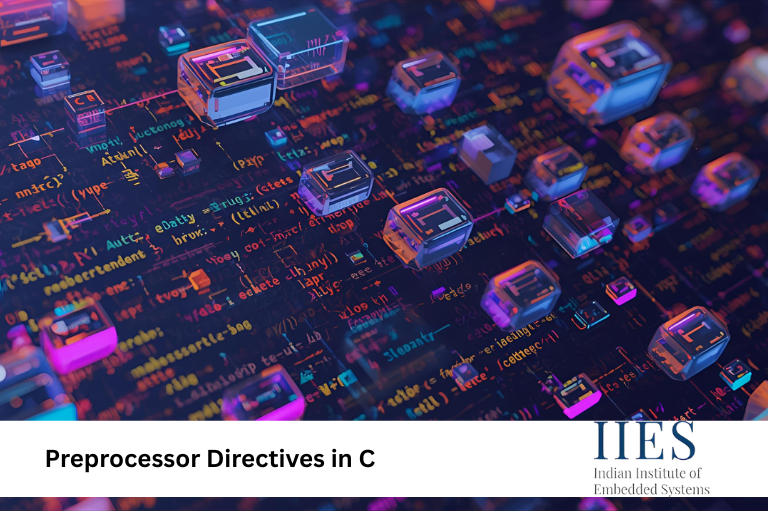What Are Preprocessor Directives in C?
The C preprocessor runs before the compiler and processes lines beginning with #. These are not part of the executable code but guide how the compiler translates the source code.
Example:
#include // File inclusion in C
#define PI 3.14 // Define in C
int main() {
printf("Value of PI: %f", PI);
return 0;
}
Here:
- #include → imports the standard I/O library.
- #define PI 3.14 → replaces every occurrence of PI with 3.14.

Preprocessor Directives in C – A Quick Overview
| Directive | Purpose | Example |
| #define | Defines macros in C or constants | #define PI 3.14 |
| #include | Handles file inclusion in C | #include |
| #undef | Removes a previously defined macro | #undef PI |
| #ifdef / #ifndef / #if / #else / #elif / #endif | Enables conditional compilation in C | #ifdef DEBUG |
| #pragma | Provides compiler-specific instructions | #pragma once |
| #error | Displays custom compile-time errors | #error “OS not defined” |
How #define Works in C
The #define directive is used to declare symbolic constants and macros in C.
Example – Constant:
#define PI 3.14159
int main() {
printf("%f", PI);
}
// Outputs: 3.14159
Function-like Macros in C
Macros can behave like functions, improving performance by avoiding function calls.
Example – Function-like Macro:
#define SQUARE(x) ((x) * (x))
int main() {
int a=5;
printf("%d", SQUARE(a));
}
// Outputs: 25
Common Mistake:
#define BAD_SQUARE(x) x * x
printf("%d", BAD_SQUARE(5+1)); // Wrong output
✅ Fix: Always wrap macro arguments in parentheses.

How #include Works in C
- System Header File:
#include - User-defined Header File:
#include "myheader.h"
This allows modular programming and reusability.
Conditional Compilation in C
Example:
#define DEBUG
#ifdef DEBUG
printf("Debugging enabled\n");
#endif
#undef and Re-definitions
#define VALUE 100
#undef VALUE
#define VALUE 200
#error Directive in C
#ifndef OS
#error "OS is not defined before compiling!"
#endif
#pragma and Compiler Instructions
#pragma once // Prevents multiple inclusions of the same header file
Include Guards in C
#ifndef MYHEADER_H
#define MYHEADER_H
void myFunction();
#endif
Advantages of Preprocessor Directives
- Enable modularity and reusability.
- Support conditional compilation in C for platform-specific code.
- Improve debugging and error handling.
- Reduce redundancy using include in C and include guards.
Common Mistakes to Avoid
| Mistake | Fix |
| Missing parentheses in macros | #define SQUARE(x) ((x)*(x)) |
| Redefining macros without #undef | Always #undef first |
| Multiple inclusions of headers | Use include guards in C or #pragma once |
| Overusing macros | Prefer const, inline, or constexpr in modern C++ |
Best Practices for Preprocessor Directives
- Prefer const variables over macros for constants.
- Use macros only when necessary.
- Always protect header files with include guards.
- Avoid complex logic inside macros; prefer inline functions.

Summary – Preprocessor Directives in C
Preprocessor directives in C are instructions executed before compilation. They allow file inclusion, macro definitions, conditional compilation, and compiler-specific control.
Key Takeaways:
- Preprocessor runs before the compiler.
- Macros in C are text replacements.
- Use #define, #include, #ifdef, and #pragma wisely.
- Avoid pitfalls like multiple file inclusions or unsafe macros.
Conclusion
Mastering preprocessor directives in C is essential for writing efficient, modular, and portable programs. From handling file inclusion and macros to enabling conditional compilation, these directives give developers powerful control over the compilation process. By following best practices and avoiding common mistakes, you can ensure cleaner, error-free, and optimized C code. Whether you are a beginner or advancing in your programming journey, understanding preprocessor directives will make you a more confident and capable C programmer.




